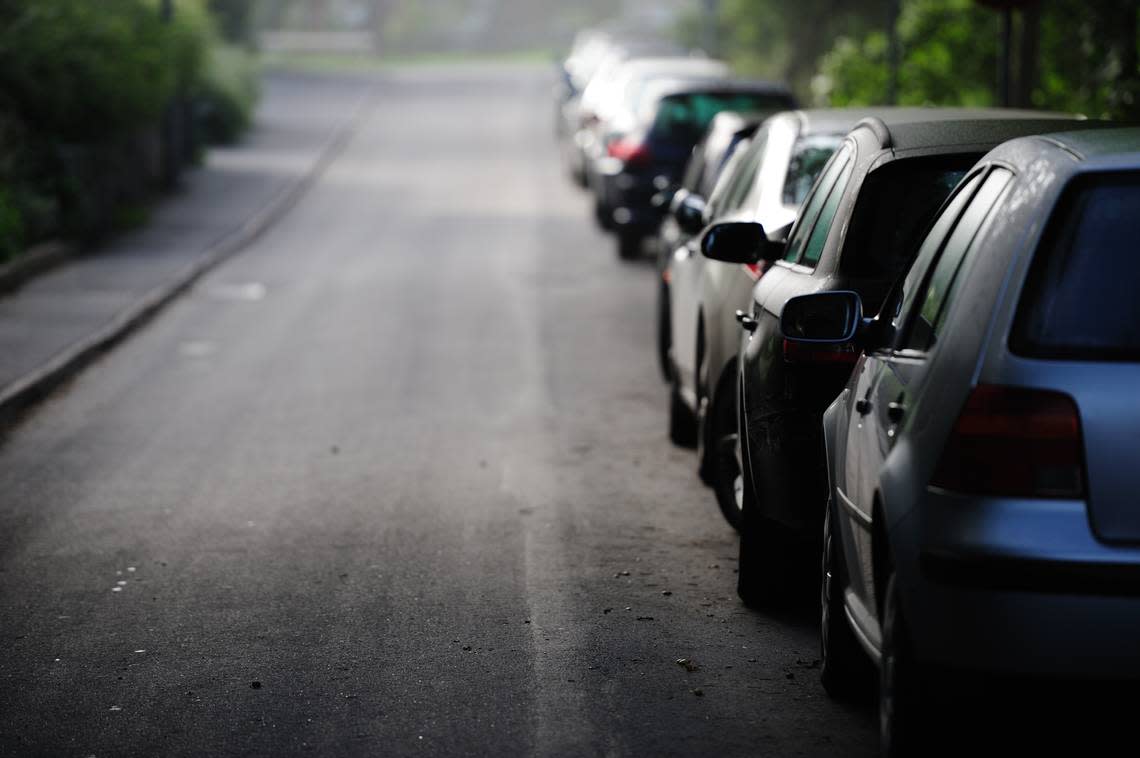How long can I park on a public street? How close to a stop sign? Know these California laws

When it comes to California’s rules of the road, there’s always a few things to note, especially when it comes to parking.
From colored curbs to “no parking” signs, there are some parking laws that might not be so obvious — or perhaps you just don’t remember.
Here’s a rundown of five California parking laws to refresh your knowledge:
Can you park next to a stop sign?
California does not have a law saying how close you can park next to a stop sign, California Highway Patrol Officer Mark Leavitt said.
As long as a vehicle is not violating one of California’s parking laws covered in California Vehicle Code 22500, Leavitt said there is no violation for parking next to a stop sign.
However, Leavitt said each local ordinance can have its own regulations.
While the city of Rancho Cordova in Sacramento County generally prohibits parking within 20 feet of a stop sign, other California municipalities can vary in the specific distance allowed for parking in front of a stop sign.
If you’re in a new city and are unfamiliar with the local rules, there will typically be a sign indicating where parking isn’t allowed.
Read more: How close to a stop sign can you park? Your California traffic law question, answered
How close can you park behind another car?
Though there are no explicit state laws that say how far behind another vehicle you should be parked, the California DMV Office of Public Affairs said drivers should leave enough space for the vehicles next to them to be able to safely leave.
If another car is parked too closely and preventing you from leaving, Gabby Miller, with the city of Sacramento, said parking enforcement can only issue a citation if there is a parking violation related to the blocked car.
As stated in the California Department of Motor Vehicle’s Driver’s Handbook, some parking violations include being parked on a marked or unmarked crosswalk, blocking a driveway and parking in front of a curb with wheelchair access.
“If both cars are legally parked, but the size of one or both has resulted in a difficult exit from the space, then no violation has occurred to warrant a parking citation,” Miller said in an email to The Sacramento Bee.
Read more: Can the city tow a car if it’s blocking you from moving? Here’s what California law says
Can you leave a car running while parked?
California Vehicle Code 22515 states, “No person driving, or in control of, or in charge of, a motor vehicle shall permit it to stand on any highway unattended without first effectively setting the brakes thereon and stopping the motor thereof.”
Officer Cody Tapley with the Sacramento Police Department, said this law applies to all public roadways as defined by California Vehicle Code 360, which includes highways, streets, roadways and off-street parking facilities.
In Sacramento, Tapley said City Code 10.36.090 states that any registered vehicle owner or driver can be charged with a misdemeanor for leaving the ignition key in the vehicle while it’s unattended in public areas, car lots, or private parking lots.
“Based on our interpretation, these two codes would not apply to residential driveways,” Tapley wrote in an email to The Bee.
Violating this law can result in an infraction with a maximum fine of $250, according to California’s 2023 Uniform Bail and Penalty Schedules. However, if local ordinances define the violation as a misdemeanor, offenders may face up to six months in county jail, a fine of $1,000, or both.
Read more: Is it legal to leave your car running unattended on California streets or in a driveway?
How long can you be parked in front of someone’s house?
A homeowner could have a car removed if it is parked in front of their driveway or if it is violating California Vehicle Code 22651, which states no vehicle can be parked continuously at one location on any public roadway for more than 72 hours. It is illegal to park your car where it blocks public or private driveways. Otherwise, you’re safe to park there.
Read more: Can you park in front of someone’s house in California? There’s a time limit, law says
Where can you park a boat or RV?
Kenneth Casparis, a spokesperson for Sacramento County, said state law governs the parking of vehicles, but no specific laws state where individuals can park recreational vehicles or boats.
Despite there being no governing state law, Casparis said the California Constitution requires local jurisdictions to regulate their land use through the use of the general plans and zoning codes.
“Local jurisdictions then adopt rules specific to their jurisdiction,” Casparis wrote in an email to The Bee. “On-property storage is also specific to each jurisdiction’s local ordinances.”
In Contra Costa County, the storage of boats and recreational vehicles is allowed on private property — with some exceptions. The vehicle must be 90% screened from public view with the use of landscaping, fencing or a building, according to the county’s website.
This can be rarely achieved when the vehicle is in the driveway, the website states.
Read more: Where can you park a boat or RV on your property? Here’s what Sacramento County law says

